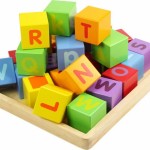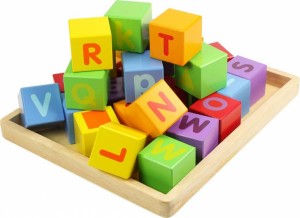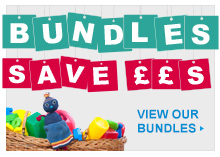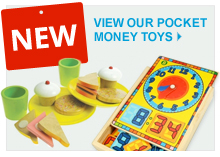

For parents of children aged up to 5 years old, the Early Years Foundation Stage (EYFS) is a vital time in their children’s lives. This is the time when parents and carers can prepare children for school and for all future learning and life in general. If your children are attending a registered nursery, pre-school or reception class, you will be aware of the requirement for child minders, nursery nurses, teachers and other child care professionals to follow the EYFS Framework which was revised in September 2012. We hope the following WoodenToyShop Guide to Toys for the Early Years Foundation Stage will prove useful to anyone wishing to buy wooden toys that are not only fun to play with, but also support learning and development in young children.
As well as outlining the legal requirements for child welfare that must be followed by anyone registered to look after children, the EYFS sets out seven areas of learning and development which have been split into three prime areas and four specific areas:
The first of the three prime areas is communication and language. Many of our toys will help children develop essential skills in this area. For example, wooden letters are an excellent starting point for helping children with pronunciation, to learn the alphabet and to begin reading and spelling basic words and names. Puppets and puppet theatres encourage children to invent and perform stories, as would a toy castle or pirate ship.
The second prime area is physical development. Young children have so much energy to burn and exercise, physical and outdoor play are essential parts of growing up. Push and pull along toys, baby rocking horses and baby walkers engage very young children with their colourful shapes, clicking and clacking noises and (very often) smiling faces while baby walkers and strollers often come laden with coloured blocks for sorting, building and stacking. Slightly older children love balance bikes, trikes and sit on toys which clearly encourage physical exercise and the development of balance and coordination while providing plenty of scope for fun.
Personal, social and emotional development is the third prime area of the EYFS framework. Play is central to how children develop personally and socially and as they begin to interact with other children and adults from outside of their immediate family, children will also learn to understand and deal with their emotions in a positive way. Toys such as dolls’ houses, wooden doll families, fire, police and hospital toys, toy kitchens and shops help children to learn to talk about their home and family environments while playing with and talking to other children and adults.
The four specific areas which complement the prime areas in the EYFS framework are areas recognisable in more formal learning environments as well as in the home: literacy; mathematics; understanding the world; and expressive arts and design.
As with the three prime areas, many toys directly encourage play that helps children learn and develop in each of these areas. The list below recommends some types of toys that will introduce the framework to your children through play.
EYFS Framework – Recommended Toys Quicklist
Communication and language
- Wooden letters
- Alphabet and ‘see and spell’ games.
- Farm toys.
- Toy castles and pirate ships.
- Emergency services toys.
- Construction toys.
- Puppets and play theatres.
Physical development
- Balance bikes.
- Hobby horses.
- Trikes and sit on toys.
- Toy skittle sets.
- Outdoor play centres, swings and sand pits.
- Garden toys.
Personal, social and emotional development
- Dolls’ houses.
- Doll families.
- Farm toys.
- Puppet theatres.
- Toy castles and pirate ships.
- Traditional board games.
Literacy
- Wooden letters and alphabet toys.
- Counting and spelling games.
- Toy puppets and theatres.
- Children’s easels, chalk boards and magnetic/white boards.
- Toy shops and market stalls.
Mathematics
- Abacuses.
- Wooden number sets.
- Domino sets and traditional board games such as snakes and ladders.
- Play kitchens.
- Toy shops and market stalls.
Understanding the world
- Farm toys and toy animals.
- Toy hospitals and fire stations.
- Train sets.
- Toy garages, cars and vehicles.
- Construction toys.
- Toy shops.
Expressive Art and Design
- Easel and paint sets.
- Chalk boards.
- Magnetic white boards.
- Coloured chalks, pens and pencils.
- Craft and hobby sets.
- Musical toys.
- Bead and lacing sets.
- Stamp sets.
For more information about the Early Years Foundation Stage, we recommend visiting the Parents Area of the excellent Foundation Years website.









